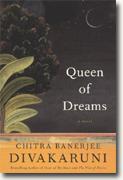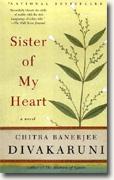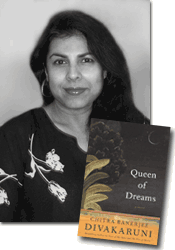An
Interview with
Chitra Banerjee Divakaruni
Interviewer Luan Gaines:
You share your love of the Indian-American culture and all its subtleties in your novels. Is there a particular message in your work?
Chitra Banerjee Divakaruni:
No particular message—just a desire that readers will enjoy and relate to the wonderful diversity of this culture. For people in my community, I hope they will recognize and smile at certain characteristics, details and foibles. For non Indian Americans, I hope it will help them see all the things we share as human beings. I hope it will break stereotypes.
The mother/daughter relationship is pivotal for Rakhi and her mother. In your opinion, is this the most powerful relationship in a girl's life?
Not necessarily—though for Rakhi in this novel it is. In Sister of My Heart, friendship between two cousins who thought of each other as sisters was the most important bond. In other novels and stories I’ve explored relationships between lovers, or even grandparents and grandchildren. It all depends on the nature of the character.
Rakhi is fascinated by her mother's mysterious past in India. How does Rakhi's obsession with India differ from her Berkeley friends, who are more involved in their day-to-day lives?
Rakhi’s parents have been atypical in not telling her much about India—which causes her to hunger for it. India becomes looming and mythical in her imagination. Because in some ways she has been denied her heritage, she longs to recreate it for herself. Her friend Belle, on the other hand, wants to escape from all the pressure her parents put upon her to be “Indian.”
Is the art of dream telling still practiced in India?
Yes, very much so.
Are there dream tellers in America, even though crossing the water supposedly negates the gift? For instance, is it possible for Jona to inherit her grandmother’s ability?
Yes, in fact Jona surprises Rakhi when she discovers that indeed her daughter has –ironically--inherited some kind of dream-telling gift from her grandmother. As a matter of fact, there are several dream tellers in the Indian-American communities here in America (sometimes one can find their ads in the Indian American papers!).
 Caught off balance by her lack of identity, problems at her shop and recent divorce ("Why is he doing this to me?), Rakhi has fallen into the role of victim. What must she do to change the direction of her life?
Caught off balance by her lack of identity, problems at her shop and recent divorce ("Why is he doing this to me?), Rakhi has fallen into the role of victim. What must she do to change the direction of her life?
She needs to stop blaming others, first of all. She needs to find her “voice” as an artist. She needs to learn to feel OK about unsolved mysteries. She needs to forgive and trust again. I think she learns all of these, to some extent, as the book goes along.
Is it difficult for a daughter to define herself in the mother/daughter relationship when the mother is very successful? How can a mother help her daughter in this regard?
For Rakhi it is. For a long time, she feels she is in her mother’s shadow—and yet strangely neglected by her. She feels she is a failure because she doesn’t have her mother’s gift, which she has always longed to possess.
I think ideally a mother can often help her daughter through this by admiring and supporting the unique gifts that the daughter does have.
Are the Dream Journals a vehicle for the dream teller’s interior life and private struggles?
Yes, because she cannot talk about her struggles and anxieties to anyone. They also become a bridge after her death, allowing her to explain herself—to some extent, at least--to her loved ones.
As a child, I was told that a woman who denies a religious (or spiritual) vocation will never be happy unless she follows that path. Is this essentially what happens to Mrs. Gupta, torn between her spiritual commitment and love for her husband?
Yes, this is the essence of her struggle: her gift demands total dedication, allowing no space for love. But she is not willing to give up that very human part of herself. It is also a struggle that many artists face. Art is a jealous flower—it demands commitment and sacrifice if you want it to blossom for you. ( I know this myself.)
Do you think that a woman can have it all, family and career?
She certainly can. But for every gain, there’s a loss. For every additional facet in our lives, there are more things to juggle. When you give time to one particular thing, there’s less time for something else. Balancing is a great art—I’m still working on mastering it!
For Rakhi's mother, the loss of her dreams is devastating, unbearable. In that context, how much do our interior lives define us?
For different people, the answer will be different. Mrs. Gupta is a very inward-looking person. That is her gift—and her curse.
 Is it her mother's death that really catapults Rakhi into personal growth?
Is it her mother's death that really catapults Rakhi into personal growth?
That is one of the elements, certainly. It leads to the discovery of the dream journals and her new relationship with her father. I think her father helps her growth as well. In a tragic way, the aftermath of 9/11 also pushes her into maturity and a new vision of herself.
While her mother was alive, did Rakhi have any room in her heart for her father?
She didn’t pay him much attention—her mother was such a magnetic character, she took all of Rakhi’s energy.
Having already forfeited his wife to her dreams, why did Mr. Gupta not fight for a larger place in his daughter’s life?
Sometimes we give up, don’t we, on getting close to those who are dear to us? I don’t think he knew how to, either. Mrs. Gupta’s death pushes him to grow, too, to assume new responsibilities and discover new talents.
In the beginning of the novel, the dream teller appears peaceful, unruffled by circumstances. Later we learn that she was very sad. Did Rakhi subconsciously intuit this message throughout her childhood?
I think so. She felt secondary. Also, she sensed a mystery—why was her mother so secretive? Why was there always a barrier between them? She will learn all these things at the end.
Does his wife’s death offer Mr. Gupta an opportunity to express his love for his daughter?
Yes. An opportunity and a need.
How do the Dream Journals bring a measure of peace to the grieving husband and daughter?
They provide a bridge between them, something over which they can connect. The journals allow them both to understand the dead woman, whom they both loved.
The events of 9/11 introduce terrible conflict and confusion into the Indian-American community. Have you found that people are generally unaware of the fallout suffered by those who "look like” terrorists?
Many are unaware. Many know only a little. Not all, of course. It depends on who you are. If you’re from the affected community (and here I include many other communities—certainly the Arab American or Afghani American communities), you’re very aware of it!
Can you speak to some of the special problems visited upon such communities, whether Indian, Pakistani or Iraqi?
There was a lot of prejudice—some of which is depicted in the book. I think the overall sorrow that we all felt was that in addition to suffering from the national tragedy of 9/11, where many of us had lost family and friends, now we were viewed with suspicion and, in many cases, blamed and attacked as un-American.
Have you begun work on another project? Can you tell us anything about it?
Yes, I’m working on Book 2 of my children’s novel-trilogy, The Brotherhood of the Conch. This volume, titled The Mirror of Fire and Dreaming, is also set in India, has many of the same characters, and follows the hero Anand’s adventures as he travels into the past with the aid of a magic mirror to battle a terrible evil.
Do you have any words of wisdom for would-be writers?
I’m not particularly wise! But I can share what has helped me: reading a lot, reading unusual and little-known books, scheduling writing time into my day, joining a writer’s group, and connecting the passion and the prose, as E.M. Forster suggested.
Chitra Banerjee Divakaruni is the author of the bestselling novels The Mistress of Spices, Sister of My Heart, and The Vine of Desire; the prize-winning story collections Arranged Marriage and The Unknown Errors of Our Lives; and four acclaimed volumes of poetry. She has recently published two books for young readers, The Conch Bearer and Neela: Victory Song. Her work has appeared in publications including The New Yorker, Atlantic Monthly, Ms., Zoetrope: All-Story and Good Housekeeping. She teaches creative writing at the University of Houston and divides her time between Houston and the San Francisco area. Visit her official site at
www.chitradivakaruni.com.
Contributing reviewer Luan Gaines interviewed Chitra Banerjee Divakaruni, author of Queen of Dreams (see accompanying review), about her book via email for curledup.com.



